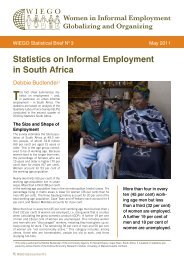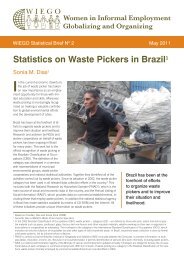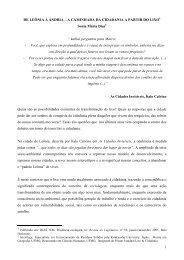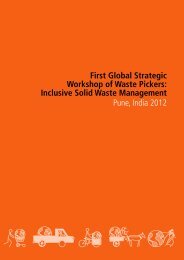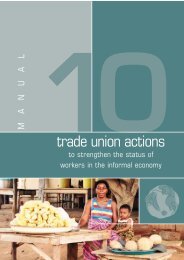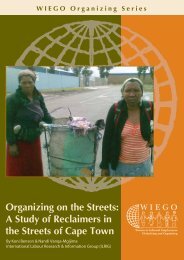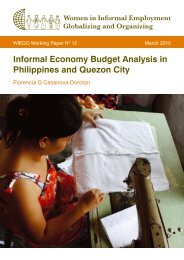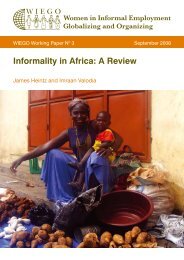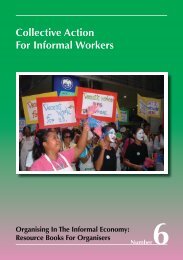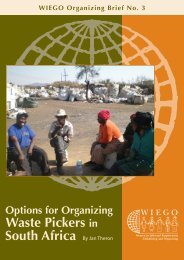Handling The Day-To-Day Problems Of Informal Workers - WIEGO
Handling The Day-To-Day Problems Of Informal Workers - WIEGO
Handling The Day-To-Day Problems Of Informal Workers - WIEGO
- No tags were found...
You also want an ePaper? Increase the reach of your titles
YUMPU automatically turns print PDFs into web optimized ePapers that Google loves.
<strong>Handling</strong> <strong>The</strong> <strong>Day</strong>-<strong>To</strong>-<strong>Day</strong><strong>Problems</strong> <strong>Of</strong> <strong>Informal</strong> <strong>Workers</strong>Organising In <strong>The</strong> <strong>Informal</strong> Economy:Resource Books For OrganisersNumber3
Organising In <strong>The</strong> <strong>Informal</strong> Economy: Resource Books For Organisers, Number 3AcknowledgementsThank you to all the many workers, organisers and their organisations whocontributed, directly or indirectly, to the production of this series of books. Specialthanks are due to Pat Horn, StreetNet International Coordinator, for her valuableadvice and feedback throughout the process, and Crystal Dicks formerly of theInternational Association of <strong>Workers</strong>’ Education Associations (IFWEA) who assistedwith the planning of the books. Our grateful thanks as well go to staff membersat StreetNet International, the Development Institute for Training, Support andEducation for Labour (DITSELA) and Women in <strong>Informal</strong> Employment: Globalizingand Organizing (<strong>WIEGO</strong>). Finally, we are very grateful to the Ford Foundation forproviding the funds to StreetNet International to produce the books.Photo AcknowledgementsCover: Demetria Tsoutouras, Small group meeting, IndiaOverview: Leslie Tuttle, Home worker making beads, Thailand1. Jeeva Rajgopaul: Vendors harassed, South Africa2. ZCIEA: Small group meeting, Zimbabwe3. LEARN: Taxi problem, Philippines4. Chris Bonner: Waste Picker, Argentina5. AZIEA: Rebuilding stalls after destruction by authorities, Zambia6. Chris Bonner: Health Education in the Streets, SEWA, Indiaii
Organising In <strong>The</strong> <strong>Informal</strong> Economy: Resource Books For Organisers, Number 3<strong>The</strong> AimsThis series of resource books aims to assist anyone who has the task oforganising workers in the informal economy. It hopes to give organiserspractical ideas on what needs to be done and how to do it.Using the Books<strong>The</strong> resource books provide ideas, guidelines and examples that you candraw upon when organising informal workers.Use them:••as an organising guide: draw on the ideas, checklists and experiences••for information: read, and share your knowledge with others••to generate ideas: create new ways of doing things••as a planning tool: use the steps and strategies to help you plan••to educate and empower: in informal discussions, workshops ortraining sessions.Three key organising principles•• Win real, immediate concrete improvements in workers’ lives•• Give workers a sense of their own power•• Alter power relationships“Be passionate, committed, innovative and creative in your efforts toward theorganisation and mobilisation of workers in the informal economy”.(Kwasi Adu-Amankwah, Secretary-General of Ghana Trades Union Congress,September 2006, addressing the ICC Conference on Organising in the <strong>Informal</strong> Economy)iv
Issues and Challenges:<strong>Informal</strong> <strong>Workers</strong> in Different Sectors<strong>Handling</strong> <strong>The</strong> <strong>Day</strong>-<strong>To</strong>-<strong>Day</strong> <strong>Problems</strong> <strong>Of</strong> <strong>Informal</strong> <strong>Workers</strong>Sector /groupStreet, marketvendors andhawkersHome-basedworkersPriority issuesRight and space to vendFacilities- storage, shelter, toilets,waterProtection against policeharassmentSafety and securityCompetition –protection againstbad effectsAccess to creditEqual income, benefits as factoryworkersIdentifying employerEnd to exploitation by middlemenAccess to regular workAccess to markets (own account)Access to credit (own account)Organising challengesNot regarded as workers by selvesand othersControlled by politicians, “mafia”Fear of harassment by authorities,policeCompetition amongst selves andformal sectorTime spent on organizing means lossof incomeNo forums for bargainingIsolated in homes, invisibleTime-double burden of work andhome careFear of losing workRestrictions imposed by religion,cultureChildren workingUnprotected by labour law ordisguised statusGarmentworkersLiving wageRight to OrganiseExcessive overtimeSecurity of employmentWomen workers are seen as‘seasonal’, ‘supplementary’ wageearnersHarassment of trade unions<strong>Of</strong>ten small workshopsv
Organising In <strong>The</strong> <strong>Informal</strong> Economy: Resource Books For Organisers, Number 3Waste pickersand recyclersAgricultural,forestry andfish workersDomesticworkersTransportworkers(urbanpassenger)Womenworkersall sectorsAll sectorsAccess/right to recyclable wasteIntegration into municipal systemsWork higher up the recyclingchainFair prices for recyclablesRecognition and improved statusHealth and safetyEnd to exploitation by middlemenRight to land and land useRight to natural resourcesRegular workAccess to resources andequipmentAccess to credit and marketsRecognition as workersProtection against dismissal, abuseFreedom of movementFreedom to change jobs (migrant)Less hours, more restBetter living conditionsAccess to routes and passengersProtection against harassmentHealth & safety/ accidentprotectionParking and facilitiesPetrol and spares prices and faresCompetition-protection againstbad effectsSafe and affordable child careIncome protection during/afterchildbirthPhysical securitySexual harassment protectionEqual income for equal valueworkAccess to higher income earningworkBetter and more secure incomeImproved working conditionsSocial protectionLow status and self esteemFear of losing workFear/dependency on middlemenCompetition amongst selvesTime to meet means loss of incomeChild labourNot protected by labour lawScattered locationsIsolated and far distancesChild labourNot protected by labour lawSeasonal or intermittent workIsolated and invisible in homesFear of employers and losing jobsDependency on employer forhousing etcNot protected by labour lawLack of time: long hoursFear of authorities (migrant)MobilityCompetition between selves andformal sectorControl by politicians, “mafia”Threats by employersFear of harassment by police/authoritiesTime for organizing means loss ofincomeFear and lack of confidenceCultural and religious barriers<strong>Of</strong>ten in scattered locationsDominated by men in sectorLack of timeChild care and home carevi
<strong>Handling</strong> <strong>The</strong> <strong>Day</strong>-<strong>To</strong>-<strong>Day</strong> <strong>Problems</strong> <strong>Of</strong> <strong>Informal</strong> <strong>Workers</strong>1. IntroductionIn this BookYou will find a step-by-step guide on the process you need to followwhen an individual member comes to you for help with a problem.<strong>The</strong> book looks at how you can decide what type of problem it is sothat you can take appropriate action. It highlights problems caused bycompetition for resources between informal economy members, andby unequal power relations between men and women members. Itsuggests some possible ways for you to help resolve member-to-memberconflict. <strong>The</strong> book emphasises the importance of successfully solvingday-to-day problems, and the role this plays in mobilising membersand strengthening organisation. At the end of the book are learningactivities. Use these to practise dealing with problems, in discussionswith members and to help train other organisers.Many different problemsIn all sectors of the informal economy, workers face many differentproblems. <strong>The</strong>ir lives are difficult at work, and very often at home. <strong>The</strong>y1
Organising In <strong>The</strong> <strong>Informal</strong> Economy: Resource Books For Organisers, Number 3will expect you, as an organiser, to help them deal with their issues andsolve their problems. <strong>The</strong>ir expectations of what the organisation can,and should, do will be high.From the minute you start recruiting, and at all stages in organising,you need to be prepared to deal with workers’ problems, big and small.Taking up worker problems, and making improvements in their lives, isthe key to building strong workers’ organisation.Sometimes you may feel that you are wasting your time on small issues,when you have much bigger, and what seem like more pressing thingsto tackle. Think again! Assisting workers with their day-to-day problemsmeans putting into practice the three key organising principles:••••••Win real, immediate concrete improvements in workers’ livesGive workers a sense of their own powerAlter power relationships2
<strong>Handling</strong> <strong>The</strong> <strong>Day</strong>-<strong>To</strong>-<strong>Day</strong> <strong>Problems</strong> <strong>Of</strong> <strong>Informal</strong> <strong>Workers</strong>2. Guidelines For <strong>Handling</strong> <strong>Problems</strong>You and your organisation will need to develop guidelines on whatissues you can assist workers with. Can you deal with a worker’s divorcecase? Will you agree when a member asks you to threaten a traffic copor other law enforcers who regularly demand bribes? Is it your duty tointervene when the husband of a women vendor beats her? Becausework and home often intersect for informal workers, they will approachyou, not only on work issues, but also with a wide range of concerns.You will need to know when and how you can help, and when and howto say “no” if you cannot assist. You will need the skill to do this in asympathetic and constructive way, at the same time directing workers towhere assistance is available, or advising how they can help themselves.You will need to assess when you can quickly deal with the issueyourself; when you need to take it up with the help of others; whocan assist you or the worker; and when it needs an organisationaldiscussion. You will have to decide if it is an individual issue or an issuefor collective negotiation. You will need to assess whether it is a problemthat many workers feel strongly about and could therefore be usedstrategically as a mobilising tool.3
Organising In <strong>The</strong> <strong>Informal</strong> Economy: Resource Books For Organisers, Number 3Organiser guidelinesWhen dealing with workers’ problems•• Be a good listener•• Be tactful and understanding- show sympathy•• Be probing-get true facts•• Be patient-allow time•• Be sensitive to gender differences•• Be honest about what you can do•• Be clear in what you will do•• Be open to advice and actively seek it•• Be calm-diffuse the anger and/or fear of members4 Experiences:Some day to day problemsBe prepared to handle problems like these:•• Sexual harassment•• Corrupt officials and requests for bribes•• Underpayment of, or deductions from, wages•• Underpayment or refusal to pay for goods•• Overcharging for supplies, services and facilities•• Dismissal or loss of work•• Threats/fear of deportation•• Traffic and “illegal” trading fines•• Accidents•• Confiscation of goods•• Accusations of stealing•• Competition and disputes with other workers•• Ill health e.g. HIV/Aids•• Inability to open a bank account•• No credit or loan facilities•• Rivalry around vending sites•• No identity document•• No trading license•• Stealing of recyclable waste collected•• Pressure to support politicians•• Refusal to supply materials and equipment•• Undercounting of piece work•• Harassment by police and authorities•• Personal legal issues such as divorce•• Domestic violence•• ChildcareAnd many more…..
<strong>Handling</strong> <strong>The</strong> <strong>Day</strong>-<strong>To</strong>-<strong>Day</strong> <strong>Problems</strong> <strong>Of</strong> <strong>Informal</strong> <strong>Workers</strong>3. Steps In Dealing With Worker <strong>Problems</strong>Step One: Hear the storyBefore you decide what to do you will need to get an overview of whatthe issue or problem is all about, and decide an initial course of action.••••Get the story from the worker. Let her tell it in her own way. Listencarefully and be sympatheticAsk probing questions to get to the bottom of the story. This willhelp you make an initial assessment of the problem and possibilitiesStep Two: Analyse the situationNow make your initial assessment to help you decide on your strategy,and the next step you need to take.5
Organising In <strong>The</strong> <strong>Informal</strong> Economy: Resource Books For Organisers, Number 3Try to establish what kind of a problem you are dealing with. <strong>The</strong>reare two major categories of problems. You will need to deal with themdifferently.••••Individual problem:You will assist or represent the individual worker.Collective problem:You /your organisation will represent workers collectively throughnegotiation and other forms of collective action.And, there is a third category:••Individual problems that apply to many other workers:You will represent the individual and/or take up collectively,depending on the circumstances.Use the checklist below to help you think through what type of aproblem you are dealing with. You may not have the full answer at thisstage but it will alert you to possibilities. It will help you decide on aninitial course of action, and help you prepare for Step 3 below.-Check List 1:What kind of problem is it?Is it an individual problem?Is it a personal problem that needs a bit of sympathy?Is it a problem that the worker should be encouraged to handle herself ?Is it a personal problem that you can immediately refer to another personor organisation?Is it a personal problem you can immediately help with yourself ?Is it a work problem that you can help sort out with the individual oradvise her how to do so herself ?Is it a problem that you need to take up with an employer or authority?Is it a complex problem that you need to discuss with others?Is it a problem between two individual members?Is it a problem that you are unable to help with?6
<strong>Handling</strong> <strong>The</strong> <strong>Day</strong>-<strong>To</strong>-<strong>Day</strong> <strong>Problems</strong> <strong>Of</strong> <strong>Informal</strong> <strong>Workers</strong>5.WHY is this a problem?Find out how the worker and/or family is affectedEstablish how severe are the consequencesCheck whether worker or human rights been violatedCheck whether laws, rules, practices have been breachedNote where you need to find out more about laws and regulations6.WANT: what is needed to correct the problem?Clarify what the worker wantsDiscuss what s/he sees as a solution, and what role s/he sees for the organisationFormulate a demand where appropriateCHECK AGAINStep Four: Find out moreBefore taking action you may need to do some more research.••••••••••••Verify the story/facts with others. This could be with witnesses, withothers in similar situations, with other people involved.Check on laws, rules, regulations, practices that affect the issue.Find out who you should approach to resolve the problem.Find out more about the person or institution you need to approach.What is her attitude? What has happened in previous dealings withthe institution, person or authority? What do other workers say?Talk to others and read about similar experiences. How did otherworkers resolve such problems?Take advice. Consult your colleagues, leaders, members. Make surethat helping one worker won’t cause a problem for others!<strong>The</strong> following table gives examples of laws, regulations or agreementsto check on before you take action. For workers with an employer anda workplace problem, always check the labour laws. For those workingon their own account, the first place to look is often local governmentregulations and by-laws.9
Organising In <strong>The</strong> <strong>Informal</strong> Economy: Resource Books For Organisers, Number 3What to check: laws, regulations and agreementsProblem Who What to checkIndividual harassedby police or localauthority officerWorker was not paidfor overtime workedPerson supplying workmade deductions fromworker’s paymentbecause of “poorquality”Employer, supervisoror fellow workersexually harasseswomen workerLocal authority“police” confiscate avendor’s goods. Shehas to pay to get thembackWorker lost her joband is scared she willbe deported10Street/market vendors,waste pickers/recyclers, taxidriversCasual or temporaryworkers, workers employedby informal businessesHomeworker working onpiece ratesAll sectors, especiallycasual/temporary workers,domestic workers, womenwaste pickers and vendorsStreet vendors, hawkers,waste pickersDomestic workers, seasonalagricultural workers,migrant workers on contractSpatial planning policiesLocal by-laws and regulationse.g. recycling of waste, health,confiscation of goodsAgreements in forceCustom and practiceRecent changes to policy and practiceNational laws, regulations, agreementsapplicableLabour lawCollective agreements in the industryor with employerAvailable dispute proceduresLabour lawCollective agreements in the industryNational policy on homeworkingConstitutionLaw on sexual harassment and legalprecedentsLabour lawWorkplace policyGuidelines from women’sorganisationsLocal by-laws and regulationsconcerning confiscationAgreements in forceCustom and practiceRecent changes to policy and practiceLegal judgments/precedentsLabour lawImmigration lawsNational policiesContracts with agenciesContracts with employersLegal precedentsStep Five: Decide what to doYou should now be in a position to put everything together and, withthe worker and the backing of your organisation, take a final decision
<strong>Handling</strong> <strong>The</strong> <strong>Day</strong>-<strong>To</strong>-<strong>Day</strong> <strong>Problems</strong> <strong>Of</strong> <strong>Informal</strong> <strong>Workers</strong>on what to do. Build on your initial analysis of the problem in Step Twoabove.At this stage you may decide to:••••••••••••Refer the worker to a person or institution that can deal with theproblem better than you. You will need to talk this through with theworker and provide information, support and encouragement. Forexample, you may need to write a referral letter or make a telephonecall to arrange a consultation. Ask the worker to report the results toyou. Make her feel that you are still concerned.Tackle the issue directly and informally, such as by having aninformal discussion with a person violating a right or actingunacceptably.Tackle the issue directly but more formally. This could involveputting forward demands to the relevant authorities or to theperpetrator. It could mean confronting an individual, arranging ameeting, writing a letter or making a telephone call. You would thenneed to take the necessary follow up actions.Take up the issue as a collective organisation issue. This meansmobilising support amongst members and bringing them in asparticipants in a collective struggle. This could involve usingavailable formal procedures such as an agreed negotiating forum,a grievance or disputes procedure or collective action. It may bean issue that you need to take up nationally through your ownorganisation, and in alliance with others.Take up the issue for the individual, and prepare to take up as acollective issue as well. You may resolve the immediate problemfor the individual, but the issue needs widespread and long-termsolutions. It requires a collective approach. This is a very commonsituation, and one that a creative organiser can build on and use tomobilise workers. Again these may be issues that need to be tackledat a national level. Examples might be insurance against death andill health, banking and other financial services.Drop the issue because the organisation cannot deal with it. It couldbe against policy; it could be an unreasonable demand; it could be11
Organising In <strong>The</strong> <strong>Informal</strong> Economy: Resource Books For Organisers, Number 3something that is not winnable and without educative value for theorganisation. If you take this course of action remember to be firmbut sympathetic and positive. Try and suggest alternative routes toresolving the issue.12
<strong>Handling</strong> <strong>The</strong> <strong>Day</strong>-<strong>To</strong>-<strong>Day</strong> <strong>Problems</strong> <strong>Of</strong> <strong>Informal</strong> <strong>Workers</strong>4. Taking up the ProblemWhat they did do?Here are some stories about what organisers did to help resolve day-todayindividual worker problems. Use them to get ideas of what you cando and how to do it. Experiences:Taking up individual problemsDomestic worker underpaid<strong>The</strong> storyWhen Maria Gomez, a household/domestic worker, counted the cash handed to her by heremployer at the end of the month, she found her wages were short. She felt a bit scared, butwent to her employer and asked her why. Her employer reminded Maria that she had takena day off to go to the doctor. She would not pay Maria for that day.Maria is a new member of the union. She approached Samantha, the organiser, and askedhow she could get her money. She felt that she was entitled to it because she had never beforetaken a day off to go to the doctor, or been off work sick.13
Organising In <strong>The</strong> <strong>Informal</strong> Economy: Resource Books For Organisers, Number 3What the organiser didShe listened to Maria, took a clear written statement and then went off to do her research.As Maria is an employee, she first went to check whether or not domestic workers fell undernational labour law. She also checked whether there were any local or municipal lawscovering domestic workers. She found that domestic workers fell under national labour law,but with restricted rights. She established that domestic workers were entitled to 7 days paidsick leave a year. As Maria had never taken any sick leave, she should have been fully paid forthat day.<strong>The</strong> organiser and Maria agreed that Maria should first try and solve the problem with heremployer. This would avoid informing the employer about her union membership. But ifthis did not work, they would consider an approach by the organiser. Maria and Samanthaspent time preparing. <strong>The</strong>y rehearsed what Maria would say and how to say it. Feeling moreconfident, Maria approached her employer, who agreed to pay her.Street Vendor’s goods are confiscated<strong>The</strong> storyBala sells cell phone covers and chargers on the streets of Kolkata. He does not have alicense yet, and has to move from site to site to avoid municipal police, and because otherhawkers often chase him away. One day, the police caught him. <strong>The</strong>y approached himroughly, kicked his goods and then walked away with them.Bala is a member of the local association of street vendors. He is not a very active member,but has stayed in the association in case he meets trouble. He approached Sharit, theassociation organiser, and asked for help to get his goods back.What the organiser didSharit listened carefully to the story and took down a detailed statement. He decided thatthis was an important issue. It involved an individual, but was an issue that affected all thehawkers. It was also an issue that was dividing workers, as those with licenses were activelyvictimising those without (often the poorest workers, and many women).Sharit consulted with his colleagues and with a local NGO that specialised in giving adviceto informal workers in the city. <strong>The</strong>y gave him information on policies and municipal by-lawsdealing with licenses and confiscation of goods. <strong>The</strong>y gave him information on similar casesthey had taken up and won against the municipality. Bala, with members, association leadersand in consultation with the NGO, decided:1.<strong>To</strong> make an informal approach to the municipal officer responsible for confiscation andrelease of goods. <strong>The</strong>y wanted to secure the release of the goods free of charge, and to see ifthey could hasten the process of obtaining a license for Bala.2.If this failed, they would draw on the association’s welfare fund to pay half of the feerequired for the release of Bala’s goods.3.<strong>The</strong> association would mount a campaign, with the support of the NGO, to try and force14
<strong>Handling</strong> <strong>The</strong> <strong>Day</strong>-<strong>To</strong>-<strong>Day</strong> <strong>Problems</strong> <strong>Of</strong> <strong>Informal</strong> <strong>Workers</strong>the municipality to provide more, and better, serviced sites, speed up the process of licensing,and to scrap the system of goods confiscation.<strong>The</strong> informal approach failed because the official concerned demanded a bribe, so theypaid the fee and Bala got his goods back. <strong>The</strong> campaign resulted in a formal negotiationbetween the association and the municipality. This is still ongoing. <strong>The</strong> campaign helpedthe association recruit many new members and begin to build unity between licensed andunlicensed vendors.Home-based worker wants a loan from the union<strong>The</strong> StoryNandi sews children’s dresses in her home. She sells the goods to her friend who has a stall atthe central market in Maseru, Lesotho. Her sewing machine was giving trouble. She neededto urgently purchase a new one; otherwise she will not be able to work and to eat. When shejoined the union a year ago the organiser told her that the union could help her with anywork problem. She should just come to the office and her problem would be sorted out. Shedecided to go there now.What the organiser did<strong>The</strong> new organiser, Neliswa, listened sympathetically to Nandi’s request. She asked whereshe got the information about the union services. Now she had a problem. <strong>The</strong> union did notgive out individual loans. It could not afford to do so. It was busy negotiating with a microfinance scheme so that women like Nandi would have access, through the union, to smallloans to buy equipment. In the meantime, how could she help Nandi?She decided to be honest with Nandi and explain the position of the union. She alsoapologised to Nandi for the incorrect information given to her. Fortunately, she had a listof micro finance agencies that specialised in loans to own account workers. She was able torecommend an NGO that ran such a scheme, and charged low interest rates. She wrote aletter to the NGO explaining Nandi’s situation and recommended that they help her. Shealso phoned to tell them that Nandi was on her way.Nandi was able to get a small loan and buy her sewing machine. She has repaid the loan andhas managed to expand her sales due to the quality of her goods. Many of her friends havenow joined the union.Death in the family: What can the organiser do?<strong>The</strong> storyWhen Clarence, a pedicab driver in the Philippines, lost his wife he did not know what to do.He had no insurance policies and no savings. His brother had buried two children recentlyand could not provide him with a loan. He decided to approach Fernando, the leader/organiser of his local drivers’ association, for help.15
Organising In <strong>The</strong> <strong>Informal</strong> Economy: Resource Books For Organisers, Number 3What the organiser didClarence explained his problem. Fernando listened sympathetically. He expressed hiscondolences and said that the association was there to help members in such a situation. Hereminded Clarence that the association collected contributions from members when one oftheir colleagues lost someone dear like a wife or child. <strong>The</strong> only thing required was proofof death, such as a death certificate. <strong>The</strong> collection would start today. In the meantime theassociation would provide a contribution and loan from its emergency fund to help Clarencearrange the funeral.16
<strong>Handling</strong> <strong>The</strong> <strong>Day</strong>-<strong>To</strong>-<strong>Day</strong> <strong>Problems</strong> <strong>Of</strong> <strong>Informal</strong> <strong>Workers</strong>5. Dealing With Conflict Amongst Members<strong>Informal</strong> workers, especially own account workers, often compete witheach other over resources such as trading sites, recyclable materials,transport routes, contracts and so on. <strong>Problems</strong> also arise from unequalpower relations between men and women such as when one membersexually harasses another, or when a member uses his power to takethe best resources. This makes it difficult to build and maintainorganisations that are based on solidarity and common interest. Itmeans that organisers and leaders are frequently called upon to solveproblems between two or more members.What can you do?This is not easy. Unless it is an emergency situation, such as a fight, youwill need to carefully assess the situation before you intervene. You willneed to dig out the true reasons for the conflict. Here are some ideas.# Preventing conflict•• Education, formal and informal, on principles and values17
Organising In <strong>The</strong> <strong>Informal</strong> Economy: Resource Books For Organisers, Number 3••••••Education, formal and informal, on gender equality and sexualharassmentOrganisational policies on competition, sexual harassment, violenceTraining leaders and workers to deal with conflict amongst members# <strong>Handling</strong> conflict•• Calm down the members. Separate them if necessary•• Try not to let things escalate. Suggest time and space for themembers to “cool off ”•• Listen and record both sides of the story. You will probably have todo this separately•• Dig out the true story. This will mean asking probing questions. Itwill mean doing additional research for yourself and talking to otherworkers•• Be objective. Do not take sides or be seen to take sides initially•• Be calm. Don’t become angry or bring your own feelings into thesituation•• Make an honest assessment of the situation•• Decide if the conflict is work related, personal or organisational•• Decide how to go about helping to resolve the conflict: Do youneed to draw in others? Can you use organisational policies andprocedures? Can you be a bridge between the members? Can youget them to:Discuss and resolve the problem themselvesAgree to follow an existing organisational policy, rule orprocedureAgree to work out a long-term solution to the problemAgree that the organisation will work collectively on the issuecausing the problem e.g. it could arise from regulations and lawsFind a compromiseApologise to each other•• Where it is obvious that someone is wrong, be firm and say so. Thisis risky, but is often necessary. Show your leadership qualities!•• As a last resort initiate disciplinary action in terms of theorganisation’s procedures18
<strong>Handling</strong> <strong>The</strong> <strong>Day</strong>-<strong>To</strong>-<strong>Day</strong> <strong>Problems</strong> <strong>Of</strong> <strong>Informal</strong> <strong>Workers</strong>6. Providing A ServiceSome organisations provide services that can help workers withindividual problems. <strong>The</strong>re are many examples such as services to helpwith legal, HIV/AIDS, healthcare, childcare and financial problems.This is something to think about as your organisation grows, as it meansworkers can get help directly from their organisation. However, whereyour organisation provides services, don’t get into the habit of merelyhanding over. Keep involved. You are the person who the memberapproached and you need to ensure that the problem is dealt with ina satisfactory way. Show interest and care. Perhaps you could suggestthat the services are organised through a member cooperative? In thisway your members will own, run and benefit from their own serviceprovision.19
Organising In <strong>The</strong> <strong>Informal</strong> Economy: Resource Books For Organisers, Number 3 Experiences:Providing a serviceLegal service in Colombia“<strong>The</strong> informal economy workers joining the CGT, like its other members, also have access toour legal services if they have a problem. We provide support, for example, to street vendorsmoved on by the police; offer help with sorting out identity papers; provide legal advice ondisputes that are not work-related (divorce, ...), and so on”.(Myriam Luz Triana, National Finance Secretary and head of women’s affairs at the Colombian General<strong>Workers</strong>’ Confederation (CGT), ITUC OnLine...107/190607)HIV/AIDS programme and service in the Democratic Republic of Congo<strong>The</strong> National Union of Congolese <strong>Workers</strong> (UNTC) runs an HIV/AIDS programme. It hastrained 45 UNTC employees and 400 members to work as peer educators. “ We have alsotaken our fight against AIDS into the informal economy. We tell informal economy workersabout the centres they can go to for testing or treatment. <strong>The</strong> UNTC peer educators canprovide them with condoms and antiretroviral drugs (ARV); we explain to them that ARVdrugs have to be taken for life”.(Marie Josée Lokongo Bosiko, Vice President of the UNTC, ITUC OnLine, 40/270807)A cooperative health clinic in Nepal<strong>The</strong> General Federation of Nepalese Trade Unions (GEFONT), with formal and informalmembers, launched a Health Co-operative Clinic. <strong>The</strong> initial share capital was 100 000rupees, made up of 500 individual worker shares and a 50 000 rupee GEFONT subsidy.Coop members contribute monthly for running costs, and GEFONT contributes 10%. <strong>The</strong>unions collect the member fees and GEFONT assists the Cooperative Executive Committeewith bookkeeping and management. <strong>The</strong> Coop has a clinic and pharmacy at GEFON<strong>The</strong>adquarters, employing one part time doctor and a pharmacist. It has an agreementwith a local hospital for secondary health care referral. Coop members and dependentspay less for their consultations than the market rate when they are sick, and get discountsat the pharmacy. <strong>The</strong> hospital also provides discounts for members. <strong>The</strong> Cooperative hassuccessfully delivered services and the federation is considering expansion and improvedservices.(Umesh Upadhyaya, GEFONT, 2005)20
Organising In <strong>The</strong> <strong>Informal</strong> Economy: Resource Books For Organisers, Number 3 LearningActivitiesActivity 2: Interviewing a worker with a problem and takinga statementAim<strong>To</strong> help you improve your skills in interviewing workers and takingstatements.TaskYou are going to role-play a discussion/interview between aninformal worker with a problem and an organiser.1. Work in groups of three.Person 1: is a worker with a problem.Person 2: is an organiser who has to interview the workerand take a statement.Person 3: is an observer and assessor.Decide who will play what role2. Work on your own for 10 minutes.Person 1: decide on what your problem is, and howyou will present it to the organiserPerson 2: plan what questions you will ask in order totake a statementPerson 3: decide what you will look for in an organiser whoeffectively deals with a worker problem and takes a good statement.3. Role-play the discussion/interview for 20 minutes. <strong>The</strong> observershould take notes.4. Assess the discussion/ interview. Observer, present yourobservations and assessment to persons 1 and 2. Worker andOrganiser, how did you perform?5. All groups come together. Discuss the key lessons.22
<strong>Handling</strong> <strong>The</strong> <strong>Day</strong>-<strong>To</strong>-<strong>Day</strong> <strong>Problems</strong> <strong>Of</strong> <strong>Informal</strong> <strong>Workers</strong>Resources and ReferencesChikarmane, Poornima and Narayan Laxmi, Organising theUnorganised: A Case Study of the Kagad Kach Patra KashtakariPanchayat (Trade Union of Waste-pickers).http://www.wiego.org/program_areas/org_rep/case-kkpkp.pdfFNV, 2003, From Marginal Work to Core Business: European tradeunions organizing in the informal economy. Report of an internationalconference, Netherlands, May 2003www.etuc.org/IMG/pdf/FNV_brochure-3.pdfInternational Federation of Worker’s Education Associations (IFWEA),2006, Building Democratic <strong>Workers</strong>’ organisation and Representationin the <strong>Informal</strong> Economy. A manual in two parts.International Transport <strong>Workers</strong>’ Federation, ITF, 2006, Organising<strong>Informal</strong> Transport <strong>Workers</strong>: Global Research Project, OverviewReport. www.itfglobal.org/education/Edu-Research.cfmInternational Trade Union Confederation, OnLine Bulletins andSpotlight Interviews, various. www.ituc-csi.org.Lund, Francie and Jillian Nicholson. 2006. <strong>To</strong>ols for Advocacy: SocialProtection for <strong>Informal</strong> <strong>Workers</strong>. Cambridge: <strong>WIEGO</strong> and HomenetThailand.http://www.wiego.org/publications/<strong>To</strong>ols_For_Advocacy.pdfSmith, Stirling, 2006. Let’s Organize. A SYNDICOOP handbook fortrade unions and operatives about organizing workers in the informaleconomy. A joint publication of the ILO, ICA and ICFTU.http://www.ilo.org/dyn/empent/docs/F652038548/Manualsyndicoop_report.pdfWeb siteswww.wiego.orgwww.ituc-csi.org23
Organising In <strong>The</strong> <strong>Informal</strong> Economy: Resource Books For Organisers, Number 3www.sewa.orgwww.sewaacademy.orgwww.streetnet.org.zawww.homenetsouthasia.orgwww.homenetseasia.orgwww.ilo.orgwww.ifwea.orgwww.cawinfo.orgwww.global-labour.orgwww.ditsela.org.zawww.domesticworkersrights.orgwww.gefont.orgResource Centre<strong>The</strong> Development Institute for Training, Education and Support forLabour, DITSELA, in South Africa has a large collection of localand international trade union education materials. <strong>The</strong>se were usedextensively in preparing the books. For access to these resources contactinfo@ditsela.org.za24
Organising In <strong>The</strong> <strong>Informal</strong> Economy: Resource Books For Organisers, Number 3NOTES26




